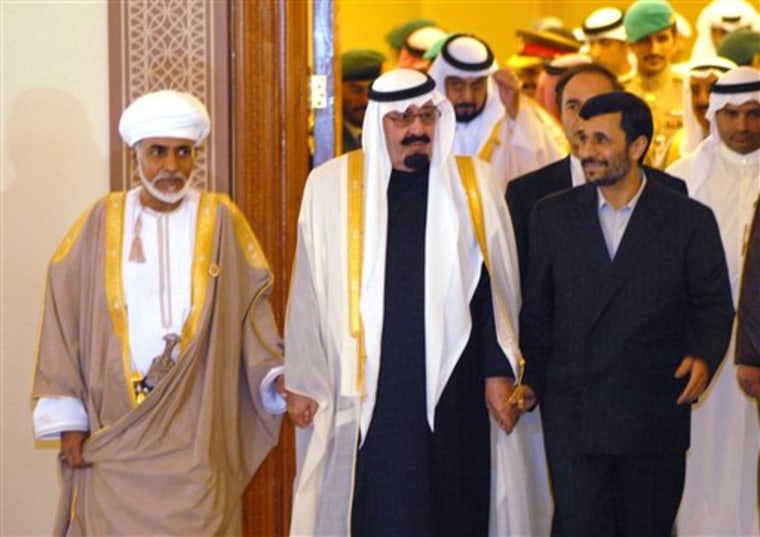President Mahmoud Ahmadinejad became the first Iranian leader to appear before a key group of Persian Gulf nations, telling the U.S.-allied Arab countries on Monday that they should form a regional security pact free of "foreign influence."
The Sunni Muslim-led states of Bahrain, Kuwait, Oman, Saudi Arabia, Qatar, and the United Arab Emirates all work closely with the U.S. military and are unlikely to accept Persian, Shiite Iran in America's place.
But the mere presence of Ahmadinejad at the Gulf Cooperation Council, a group formed partly to counter the spread of Iran's Islamic revolution, was a powerful Arab acknowledgment of Tehran's rising regional power.
"We call for peace and security without any foreign influence," said Ahmadinejad, who was escorted along the red carpet by King Abdullah of Saudi Arabia. Ahmadinejad proposed the "establishment of economical and security pacts and institutions among the seven states" here to "serve the people of our region" and enable "peace and prosperity for all."
Ahmadinejad has proposed similar cooperation with Gulf states in the past, but not a formal pact.
The Gulf meeting came less than a week after Arab nations attended a U.S.-sponsored Mideast peace summit in Annapolis, Md. The conference was widely seen as an American attempt to unite countries in the region against Iran, which has been greatly strengthened by the U.S. removal of two bitter enemies on its border — Saddam Hussein in Iraq and the Taliban in Afghanistan.
Council origin was to counter Iran
The GCC was established shortly after the outbreak of Iraq-Iran war in 1980 to strengthen Arab sheikdoms and emirates in the Gulf, and also to counter what was perceived as growing Iranian influence across the region. The meeting in Doha was the Council's 28th annual gathering.
In an apparent attempt to assuage Gulf concerns about Iran's nuclear program, Ahmadinejad invited Gulf leaders to Tehran to discuss his pact proposal, which also calls for unspecified cooperation in the nuclear field and the training of Gulf scientists in Iran.
"This will be a huge step toward reinforcing friendly relationship between the states," Ahmadinejad said. "Our cooperation will unite against any foreign influence or injustice ... We should make every effort to have the region devoid of any tension or crisis."
"The Islamic Republic of Iran is prepared to make its expertise and knowledge available to regional states," he concluded, adding he hoped the GCC would reach a "breakthrough decision."
There are about 40,000 U.S. troops on bases across the Gulf — including Kuwait as a key staging ground for Iraq and an expanding presence in Bahrain as host of the U.S. 5th Fleet headquarters.
Iran could become energy supplier
But many countries in the region — including Bahrain and the Emirates — have deep cultural, historical and business ties to Iran, along with large Shiite populations, and increasingly look to Iran as a crucial source for oil and gas when their own fields begin to dwindle in coming decades.
Ahmadinejad addressed the Council immediately after the Emir of Qatar, Sheik Hamad bin Khalifa Al Thani, said Iran was prepared to transport energy through the region.
The Iranian president's attendance at the GCC was a "significant development," said Mehran Kamrava, head of a center for international and regional studies at the Doha campus of the Georgetown University's School of Foreign Service. It keeps the "channels with Iran open," he said while cautioning against translating "rhetoric into actual policy."
After Ahmadinejad's speech, the leaders withdrew for closed-door meetings. Ahmadinejad also separately met with the Emirates leader, Sheik Khalifa bin Zayed Al Nahyan, according to the Emirati state WAM news agency. They were expected to discuss bilateral issues and also disputed islands both countries claim.
The Qatari emir urged dialogue among the Gulf states and said the United Nations should be the place to resolve regional disputes.
"While we realize that the mounting crises in the region have their reasons and backgrounds, and many of them are clear to us, we hope that all those who are concerned with the regional and international issues reconsider their positions before it is too late," Al Thani said.
No other nations addressed the gathering Monday.
